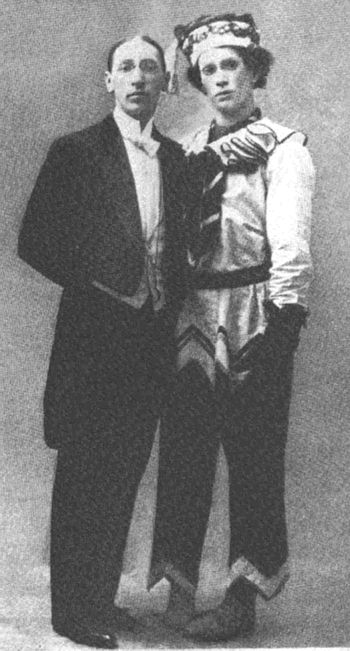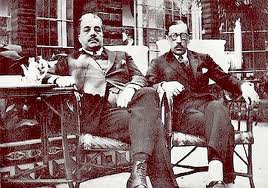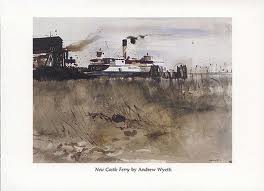 After spending two happy weeks in Florida, I headed up to Delaware on Saturday morning to attend back-to-back staged workshop performances of Danse Russe, the new opera about the making of The Rite of Spring that Paul Moravec and I are writing for Philadelphia’s Center City Opera Theater. The first one took place on Saturday evening at the rehearsal studios of OperaDelaware in Wilmington, the second on Sunday afternoon in the auditorium of the Ethical Society of Philadelphia on Rittenhouse Square. As if that weren’t enough activity for one frenzied weekend, I also squeezed in a fast side trip to Philadelphia’s Arden Theatre to see their new revival of Eugene O’Neill’s A Moon for the Misbegotten, which I’ll be reviewing for The Wall Street Journal in a couple of weeks.
After spending two happy weeks in Florida, I headed up to Delaware on Saturday morning to attend back-to-back staged workshop performances of Danse Russe, the new opera about the making of The Rite of Spring that Paul Moravec and I are writing for Philadelphia’s Center City Opera Theater. The first one took place on Saturday evening at the rehearsal studios of OperaDelaware in Wilmington, the second on Sunday afternoon in the auditorium of the Ethical Society of Philadelphia on Rittenhouse Square. As if that weren’t enough activity for one frenzied weekend, I also squeezed in a fast side trip to Philadelphia’s Arden Theatre to see their new revival of Eugene O’Neill’s A Moon for the Misbegotten, which I’ll be reviewing for The Wall Street Journal in a couple of weeks.
Part of the process of writing an opera for Center City Opera Theater involves presenting public workshop performances at which the members of the audience are invited to comment on what they’ve just seen. We got quite a few valuable suggestions after both performances of Danse Russe. A playwright who saw the show in Wilmington told me, for instance, that the character of Sergei Diaghilev, the legendary ballet impresario who commissioned The Rite of Spring, wasn’t active enough–everybody in the opera talks about him, but you never see him at work backstage. This was an astute comment, and precisely the kind of mistake that an inexperienced playwright (i.e., me) is prone to make.
 A minute or two after the playwright spoke up, the light went on and I said to Paul, “It just hit me–Diaghilev doesn’t have an aria of his own, and I think he really needs one.” I blush to confess that I made the same mistake in writing the libretto for The Letter: we didn’t give Pat Racette’s character an all-alone-on-stage moment at any point in the first draft of the opera. As soon as Pat pointed that fact out, I saw our mistake, and Paul and I went straight to the studio and wrote her big aria.
A minute or two after the playwright spoke up, the light went on and I said to Paul, “It just hit me–Diaghilev doesn’t have an aria of his own, and I think he really needs one.” I blush to confess that I made the same mistake in writing the libretto for The Letter: we didn’t give Pat Racette’s character an all-alone-on-stage moment at any point in the first draft of the opera. As soon as Pat pointed that fact out, I saw our mistake, and Paul and I went straight to the studio and wrote her big aria.
The point of this story is, of course, that theater in all its forms is both empirical and collaborative. An opera or play must work on stage. Furthermore, you don’t know what works or doesn’t work until you get the show in front of an audience, and it’s essential at that point that you be open to other people’s ideas about how to make it work better. If you bring a my-way-or-the-highway attitude into the rehearsal studio, you’re going to crash and burn. Paul and I, by contrast, are completely comfortable about being frank with one another, and when smart people make suggestions, we listen–hard. That’s why we’re getting so much out of Center City’s workshop-and-talkback process, which has already made Danse Russe a much better piece and will undoubtedly continue to do so.
I’m pleased to say, though, that we also got our fair share of praise as well. The compliment I appreciated most came from Lena Ryepkina, our excellent and exceedingly nice pianist, who was born in Kiev. Lena told me that I’d gotten all the Russia-related details right, and asked in all innocence whether I spoke Russian. I confessed to being a hopeless monoglot, to which she replied, “Then how did you know to make Diaghilev say ‘сукин сын’?” (That’s Russian for “son of a bitch.”) I confessed, much to her amusement, that I’d gotten it out of a James Bond novel.
I’d accumulated quite a pile of notes by the time that Sunday’s performance was over, as had Paul. Alas, I’ve not yet had any time to go to work on them. In fact, I didn’t even have time for dinner on Sunday: I went straight to the hotel, checked in, walked over to the Arden to see A Moon for the Misbegotten, then grabbed a quick bite to eat after the show and returned to the hotel for a much-needed night’s rest.
 Wilmington, by the way, has a first-class downtown hotel, and Paul and I both had the good fortune to stay there on Saturday night. The Hotel du Pont is, to put it mildly, no ordinary hotel: it shares a building with DuPont’s corporate headquarters and a Broadway-sized theater called, logically enough, the DuPont Theatre. After dining on the hotel’s much-praised Sunday brunch, we were given a tour of the facilities, which also include a Versailles-style ballroom and a dining room on whose walls hang a half-dozen or so museum-quality Andrew Wyeth watercolors. I’m still trying to ratchet my jaw back into place. The life of an itinerant opera librettist and drama critic is full of unexpected pleasures!
Wilmington, by the way, has a first-class downtown hotel, and Paul and I both had the good fortune to stay there on Saturday night. The Hotel du Pont is, to put it mildly, no ordinary hotel: it shares a building with DuPont’s corporate headquarters and a Broadway-sized theater called, logically enough, the DuPont Theatre. After dining on the hotel’s much-praised Sunday brunch, we were given a tour of the facilities, which also include a Versailles-style ballroom and a dining room on whose walls hang a half-dozen or so museum-quality Andrew Wyeth watercolors. I’m still trying to ratchet my jaw back into place. The life of an itinerant opera librettist and drama critic is full of unexpected pleasures!
By the time you read these words, I’ll be on my way to Winter Park, Florida, where it’s warmer–a lot warmer, I’m glad to say. I’ll be giving a talk about my Duke Ellington biography tomorrow night at Rollins College, about which more here, then driving down to West Palm Beach to see yet another show, about which more in due course. As always, watch this space for details!
Archives for January 17, 2011
TT: Almanac
“But of course acting is not truth. You can’t pretend that it is. An effect is an effect, whether you like it or not.”
John Gielgud (interviewed by John Miller in John Gielgud: An Actor’s Life)
